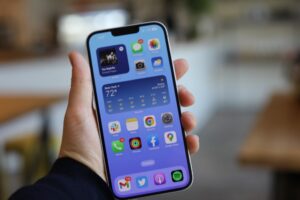China Bans iPhones as their relationship with the United States continues to deteriorate, the country has made a significant step toward limiting the influence of foreign powers as it bans central government employees from using iPhones in the course of their official duties.
This action, which was first reported by the Wall Street Journal, is expected to have a negative impact on how consumers see Apple in its second-largest market. According to the report, the nation is also requesting that government employees refrain from bringing electronics made by foreign companies into their places of employment.

According to the article, China bans iPhones for some members of its government personnel to refrain from using iPhones in chat groups or meetings in order to strengthen the country’s national security and lessen the influence of foreign technology. On the other hand, it is unclear as to whether or not the government has distributed a widespread internal order.
The United States and China have been trading technological advances back and forth in an effort to lessen their reliance on the other country’s innovations. In the past several years, the United States has taken action against China-based technology giants by prohibiting the sale of products manufactured by companies such as Huawei and ZTE. The use of the video-sharing app TikTok on work-issued mobile devices is restricted at a number of government entities. In addition, in March, the Congress requested that the CEO of TikTok, Shou Zi Chew, come before them on the security concerns that have been raised over data sharing with China.
According to Reuters, in 2021, several Chinese government agencies restricted Tesla automobiles from their premises. This prompted the electric car company to release a statement assuring its consumers that its anti-theft “sentry mode” complies with the country’s cybersecurity standards and saves data onshore. The statement was issued after the Chinese government agencies banned Tesla vehicles from their premises. In recent years, there has also been a statewide drive to replace computer software that is used by government agencies and state-owned firms with alternatives that are developed locally, which has caused a small boom in the SaaS industry.
Read Also;China's Search Engine Pioneer Launches Open-Source Broad Language Model To Compete With OpenAI
Apple places a significant amount of its production and retail business in Greater China. According to the report for the company’s fiscal quarter ending July 2023, the area, which consists of Hong Kong, Macau, and Taiwan, was responsible for approximately 19% of the income generated in the three months that concluded in July.
An analyst note from UBS indicates that Apple shipped 3.1 million units in China during the month of July, which represents a decline of 2% year-on-year. It was also revealed in the note that China was responsible for 23% of iPhone sales units during the course of the previous year.
However, the American smartphone giant has never had an easy relationship with China, primarily because of censorship concerns over the App Store. Apple, like with many other Western technology companies, is in a difficult position because it is trapped between Western politicians who advocate for freedom of expression and Beijing’s desire to eliminate anything that is regarded to be politically sensitive.
Read Also;iPhone Camera App Obscura Publishes iPad-Compatible Version
Apple, for instance, garnered a lot of attention after it began restricting the use of AirDrop in China to just ten minutes under the settings for “Everyone” last year. It ultimately rolled out the update to other regions of the world, but critics have linked the change to Apple’s succumbing to the pressure from Beijing. This is because the function was used by protestors in China to overcome censorship controls. Apple’s adjustment has been attributed to Apple’s bowing to Beijing’s pressure.
Apple did not provide a statement regarding the story right away.
Follow our socials Whatsapp, Facebook, Instagram, Twitter, and Google News.








